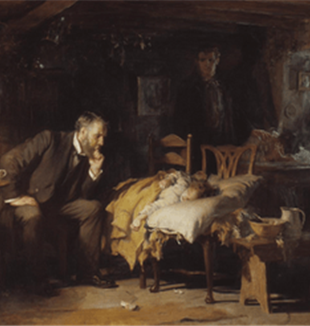
"Is it Possible to Thrive in This Work?"
Medical professionals gathered in November for the annual MedConference to reflect on the last year and to look ahead together.The last 18 months have been a time of great challenge for health care workers. Many have questioned why they ever chose this field and many have left their jobs completely for many reasons, including the high risk of contracting COVID-19, being underworked during the shutdown or overworked and short staffed when things reopened. Still others have left or conceded to discouragement and fatigue from the donning and doffing of PPE, which can feel like barriers to developing a relationship with their patients. Many ask, “Can I endure this work?” and many did just that. But is it possible to thrive in this work?
What a gift to be reminded by my friends, the purpose of my vocation! The medconference occurred virtually this year, on November 13 and I am so thankful to my friend who prompted us to gather as friends in one space here in Minnesota. We heard from Dr. Fromm (Fedi) who cares for hospitalized COVID-19 patients on a daily basis, accompanying some back to health and others less fortunate, to death, along with their family members, many of whom were not allowed to the bedside. She humbly shared the impact this had on her personally, as well as her relationship with family and friends. Most of all she is learning to be a beggar. She reminded me that mercy and compassion is what we need most in this unusual time where sickness has been tainted by politics. Lisa Kilgard, charge RN on the same COVID unit, gave a similar witness of finding the strength needed to care tirelessly for these patients through companionship and a little humor. They shared how their hearts began to move from fear to purpose and passion - and they circled around to discover the true purpose in their vocation.
Dr. Painter (Mark), immunologist at Penn State Heath, followed with a discussion of basic cell function and immunology and detailed the steps that have led to the production of a novel and efficacious vaccine in an extraordinarily short time thanks to previous years of hidden dedicated research, and its implications for the future. This discovery unveils the meaning of doing research in the context of a health care emergency, with the potential of unprecedented improvements in global health. Mark shared his personal passion for this work which inspired and gave me hope that none of our work is wasted, and following our desire and curiosity is critical.
The effect of the pandemic goes beyond the patients infected with the virus, as we all have seen. Dr. Theo Boer from the Netherlands spoke of how COVID has affected medical care in the setting of end of life care in a country where euthanasia is legal. Further discussions with Catherine Chen and Dr. Suzanne MacDonald focused on the impact of the pandemic which has led to extreme isolation and suffering, specifically teen-agers with depression and eating disorders as well as children with Autism Spectrum Disorders.
One of the greatest gifts of this time together with my medical colleagues was the chance to break out of our personal cubicle of isolation and listen to one another. I was acutely aware of my desire to live this together, to be strengthened by one another and to grow in compassion to care for the other. I am reminded to beg for mercy when I feel inadequate and to offer mercy even when the circumstances are difficult to understand. Our small gathering of 12 friends brought this international event right home to Crosby, and nudged my heart to move and to beg.
Monica, Crosby, MN